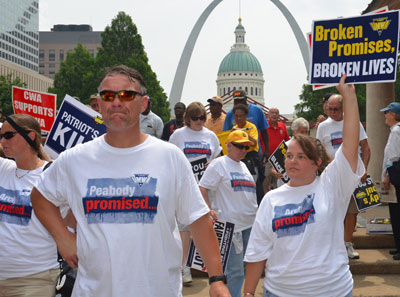

Vol. 77/No. 25 July 1, 2013

|
| Militant/Jim Garrison |
| Miners and supporters rally June 17 in St. Louis against Peabody, Arch and Patriot coal companies’ moves to tear up Mine Workers’ contracts and walk away from retiree health obligations. |
“This is the ninth rally in St. Louis,” said Steve Earle, international vice president from District 12, welcoming everyone to the rally. “We will not stop rallying, not stop marching and speaking out against this injustice.”
In a well-calculated scheme, Peabody Energy created Patriot in 2007 by spinning off many of its mining operations in West Virginia and Kentucky, including all of its union mines east of the Mississippi.
The spinoff included a number of Peabody mines with contract obligations to retired miners. A year later Patriot bought Magnum Coal, a similar spinoff created by Arch Coal. Ninety percent of the miners whose benefits will be slashed never worked for Patriot.
“They told me that if I stayed for 20 years I would have a pension and medical care,” Wayne Lodge, a retired miner who worked at Peabody’s Baldwin Mine in Marissa, Ill., told the Militant. “Now they’ve turned around and we get nothing and they get everything.”
Lodge, who has been to every rally, said, “Peabody closed the Baldwin Mine after the ’93 strike during the week of Christmas.”
With sanction from U.S. bankruptcy Judge Kathy Surratt-States, Patriot said it intends to rapidly eliminate its funding for retiree health benefits and tear up the UMWA contract for working miners.
The bankruptcy judge gave the green light to replace the current health care fund with a Voluntary Benefit Association. The ruling also backed Patriot’s proposal to make cuts in the wages and benefits in the UMWA contracts at the Patriot mines “to a level consistent with the regional market.” The court ruled that Patriot can begin imposing these conditions July 1.
This affects the lives of 23,000 retired miners and their dependents and some 1,650 UMWA miners at the Hobet 21, Federal No. 2 and Guyan mines in West Virginia and the Highland No. 9 mine in Kentucky.
“I came to stand up for our rights and to support the miners and everyone fighting what Patriot is doing,” said John Kirby, 21, who works at Consol’s McElroy Mine in West Virginia.
“The bankruptcy judge didn’t seem to care too much when she said it was just the breaks if retirees had to decide between medical care and food,” said Charles Sutton, 77, a retired miner from Eagle No. 2 in Shawneetown, Ill. “Well I don’t think much of what she said, and I don’t want to have to make a choice between food and medicine.”
UMWA officials continue to negotiate with Patriot for “a workable alternative to the severe terms Patriot asked for last spring and that were approved by the bankruptcy court,” according to a statement issued by the union.
On June 12, UMWA President Cecil Roberts said the company walked out of negotiations the day before.
“The union had agreed to more than $400 million in savings for the company over the life of the current contract, which gave them the money they say they need to survive. But that still wasn’t enough for them,” Roberts said.
Patriot officials said they took a two-day recess to conduct “a financial analysis.” Negotiations have since resumed.
“The government stands by and watches all this happen,” said Terry Wilson, a ram car operator at the Patriot mine in Waverly, Ky. “But if it comes down to a fight, it’s a fight we’re going to give them.”
Some 30 members of Communications Workers of America Local 6300 came to the rally to give their support. “The reason we are at this rally today is the UMWA by the thousands stood witness in our fight against Verizon when they sold off home phone lines,” explained Mike Burbon, 49, vice president of CWA Local 6300.
Peabody and Arch Coal “made billions from the sweat and hard work of our members, and if these executives think we’re going to sit idle while they abandon their promises and put our members at risk — well, then they don’t really know or understand the United Mine Workers of America,” UMWA President Roberts told the rally.
In addition to Roberts, rally speakers included CWA Chief of Staff Ron Collins; SEIU Local 1 Vice President Nancy Cross; Lew Moye, president of the St. Louis chapter of the Coalition of Black Trade Unionists; Kevin Kern, chief of staff to Rep. Bill Enyart from Illinois; Jeff Roorda of the St. Louis Metropolitan Fraternal Order of Police; Rev. Donna Blythe from the Sunfield United Methodist Church of Christ in Du Quoin, Ill.; UMWA International Vice President James Gibbs; and Robert Soutier, president of the St. Louis Labor Council.
Brianna Price, 20, came with a group of 10 fast-food workers. Their campaign for higher wages, better conditions and respect is called “St. Louis can’t survive on $7.35,” the state’s minimum wage. “The miners joined us when we protested here on May 9, so we’re here to help them too,” she said.
The union has called another protest rally for July 9, tentatively set for the football stadium at Fairmont State College in Fairmont, W.Va.
“We have to let other people know about this fight, we have to get more support,” said Carol Smith of Coulterville, Ill. Carol and her husband Sonny, a miner from 1969 until 2004, were part of the UMWA strike against Peabody in 1993. “If we can get the information out they will come.”
John Hawkins and Joe Swanson contributed to this article.
Related articles:
Coal miners determined to fight anti-union assault
Next rally called for July 9 in West Virginia
On the picket line
Deaths in plant fires in Louisiana highlight bosses’ drive for profit
How 1930s class battles forged fighting union in Minneapolis
Bankruptcy courts exist to protect bosses’ interests
Front page (for this issue) |
Home |
Text-version home